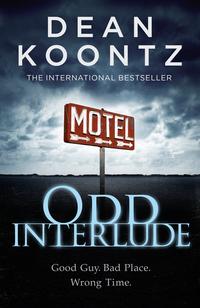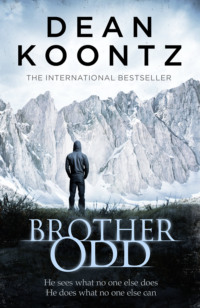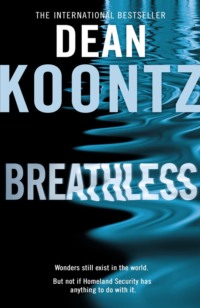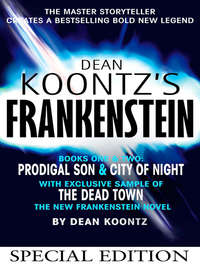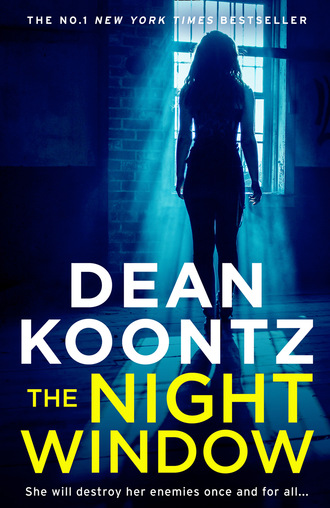
Полная версия
The Night Window
Jamming the poles of the Taser against the blind man’s neck, Charlie pulls the trigger.
To John Duncan, a five-second shock probably feels as if a hive of wasps has come alive inside him, swarming and stinging through bone and flesh in an angry search for an exit. His teeth chatter like one of those old novelty sets of wind-up dentures, and then they stop clacking against one another when his jaws clench tight. He shudders, writhes in place, as if tortured by clonic seizures, which continue for a moment after his tormentor lets up on the trigger; his body jerks, arms flail, and then semiparalysis locks him in his corner of the bench. He is pale and glistening with perspiration. A thread of drool unravels from one corner of his mouth. Faithful to his dog, he neither calls out for help nor screams in pain.
If Duncan makes a scene, Charlie won’t follow through on his promise to cut the eyes of the shepherd. He likes dogs. He isn’t a monster. He hates people, but he likes dogs. The threat to harm Argus is just a tool to control the blind man, to ensure that he will be submissive.
The second Tasering lasts ten seconds.
Traffic slows and then surges on Santa Monica Boulevard, each motorist in his own world as surely as he is isolate in his vehicle, oblivious of the drama on the park bench as he is also abstracted from the lives of the other citizens of the city. John Donne wrote, No man is an island, entire of itself, which Charlie Weatherwax knows to be the ripest bullshit. The human species is an infinite archipelago of islands with rough seas separating them. All men and women are vortexes of pure self-interest, their self-love whirling at such velocity that true concern for others can never escape the centrifugal force of their narcissism.
To see his victim’s vacant stare, Charlie plucks off John Duncan’s sunglasses and throws them aside before Tasering him yet again, this time for fifteen seconds. Throughout Duncan’s body, every fascicle of nerve fibers short-circuits. The sightless orbs roll back in the man’s head as he is once more gripped by seizures, so that his gaze is without irises, blank and white, a stare as pitiless as nature itself.
Charlie puts away the Taser and rolls the half-paralyzed blind man onto his right side, against an arm of the bench, just long enough to extract the wallet from his right hip pocket. He finds a photo ID and memorizes Duncan’s street address. He returns the ID and leaves the wallet on the bench.
Hardly more than a minute has passed since Charlie administered the first shock.
They still have the park to themselves, though a woman pushing a stroller is entering from Wilshire Boulevard.
Propping Duncan in a corner of the bench, Charlie says, “Do you hear me, Johnny?” The blind man makes a wordless sound of distress, and Charlie amps the menace in his voice. “Do you hear me, Johnny?”
Duncan’s words are slurred, but his eyes roll back into place, like symbols on the wheels in the windows of a slot machine, bright blue but oblivious. “Yeah, I hear.”
“I looked in your wallet. I know where you live. You ever tell anyone about this, describe me to anyone, I’ll pay you a visit.”
“No. I won’t. I swear.”
Charlie rises to his feet. “Random acts of cruelty, Johnny. That’s what the world’s about. That’s the sum of it. Get ready for the next one. It’ll be coming. They’re always coming.”
The woman with the stroller has stopped at a distant bench. If she eventually continues in this direction, she will not find the blind man while Charlie is still in sight.
He continues on his way. When he glances back, he sees John Duncan leaning forward on the bench, vomiting on his shoes.
In a couple of hours, the dog will wake. An hour after that, it will be alert and stable enough to lead its master home in the early dark.
The pain John Duncan has experienced is nothing compared to the profound humiliation that he now endures and that will seethe in him for days to come. Perhaps he will fall into despair, which is not necessarily a bad thing. If it does not destroy you, despair can be a fire that burns away the erroneous understanding of the world by which so many people live. If all of the blind man’s illusions can be reduced to ashes, if he can come to understand the truth of the world, that it was not shapen except by chance and that it has no meaning, that nothing matters but power, its acquisition and its use, that power is won by the infliction of pain and humiliation on others, then he will be free for the first time in his life. Even with the limitations of his disability, he might more often avoid being a victim.
Serving as a missionary of pain and humiliation, committing random acts of cruelty, is not work suitable for a common street thug or a crooked politician. Both drug-pushing gangbangers and corrupt senators lie to themselves and to others, claiming to act for the benefit of the clan, for the common good and social justice, in response to oppression, when in fact they seek power for power’s sake. Liars and those who live a lie cannot remake the world for the better. A missionary, like Charlie Weatherwax, must embrace no lies, must live by no illusions, bleak as that might be, for power is the only truth, and truth is the source of power.
4
With its thousands of blacktop rivers and millions of metal currents, the Los Angeles evening rush lasted not one hour, but three or four. The Valley streets overflowed with vehicles surging-slackening-surging to and from the dysfunctional freeways. Vikram gave Jane an address, but the flood of traffic didn’t frustrate her. There were many questions to be answered, explanations to be made, and an understanding to be arrived at before they reached their destination.
She said, “You could have confronted me in the library.”
Vikram shook his head. “Not safely, I think. When you see me suddenly show up, you don’t see a lean but sinewy dark-eyed black-haired young man who might have been a Bollywood star. Instead you see FBI, and you think you’re trapped. So logically, an unfortunate confrontation ensues.”
“‘Lean but sinewy’?”
Vikram shrugged. “When describing myself to various online matchmaking services, the word ‘slim’ can be interpreted as meaning skinny or worse. Anyway, say I show up in the library and say just maybe you don’t shoot me, there’s still bound to be a scene that people are witness to. They call the police, they post it on YouTube, and we are toast.”
“Your relatives herded me into that vacant photography studio. Why weren’t you waiting for me in that place, where there weren’t any witnesses?”
Vikram raised his right hand, pointing at the roof of the SUV with his forefinger, as if to say, One important point to consider. “Remember, the chase had only just begun, and you were virtually sweating adrenaline.”
“I don’t sweat virtually.”
“Nevertheless, the math said the risk of my being shot on sight was still too high at that time.”
“‘Math’?”
“I have my formulas. It was wiser to lead you through a few twists and turns, give you time to understand this wasn’t a standard law-enforcement operation. Then I show up alone, no backup, and you realize I am harmless.”
“Who is Garret Nolan?”
“Mr. Motorcycle? He’s not one of us. He was just a hiccup. There are always hiccups. Some say that life is one long series of hiccups, although personally I’m not so pessimistic. Farther along that street from Mr. Nolan, a Honda waited at the curb, its engine running. A bright red Honda. Studies show that, in a crisis, the eye is drawn to red things. My brother, wearing a flamboyant red shirt, was prepared to leap out of the red Honda and dash into a Chinese restaurant, ostensibly to pick up an order of takeout, but in fact giving you a chance to steal his wheels, which of course we could track by its GPS. However, you found Mr. Nolan first. Beware, the traffic light is about to turn red.”
Jane braked to a stop. She looked at her passenger.
Smiling into her silence, Vikram said, “What?”
“You scripted it like some chase scene in a movie?”
“When I build a back door into the computer system of a major telecom provider, I don’t just wing it, you know. To get away with it, I have to be meticulous. Being meticulous is what makes me Vikram Rangnekar.”
“If Garret Nolan was a hiccup, unexpected, how did you track me from the time he gave me a ride?”
“Just in case, my cousin Ganesh tagged you earlier in the library.”
She recalled the plump guy in khakis and a yellow pullover, at a workstation near her in the computer alcove. “‘Tagged’?”
“As you were leaving, Ganesh fired a little device loaded with an adhesive microminiature transponder. Hit you in the back.”
When she had glanced at Ganesh, he’d been holding something in his left hand, down at his side. “I didn’t feel it happen.”
“You wouldn’t,” Vikram said. “It’s low-velocity. The soft projectile weighs three-quarters of an ounce. It partially unravels and weaves itself into the fabric of your coat. Lithium battery the size of a pea. It’s trackable by satellite, just like any vehicle with a GPS.”
She said, “Jhav.”
Vikram’s eyebrows arched. “That is a Hindi word.”
“But appropriate.”
“Wherever did you learn that word?”
“From you.”
“Not possible. I would never use that word in the presence of a woman.”
“You use it all the time when you’re at a computer, backdooring your way into one place or another.”
“Is that really true? I was unaware. I hope you don’t know what it means.”
“It means ‘fuck.’”
“I am mortified.”
“It’s me who should be mortified, being tagged and not even aware of it. Jhav!”
A horn blared behind them. The light had changed.
Vikram again pointed at the roof with one finger. “The light has changed.”
“No shit?” she said as she took her foot off the brake.
“I sense you’re perturbed at me.”
“No shit?”
“Why are you perturbed at me?”
“You played me. I don’t like being played.”
“The math said it was necessary.”
“Math isn’t everything. Trust is important.”
“I trust the math.”
“I remembered you as a sweet man. I forgot the annoying part.”
Vikram grinned. “Is that really true?”
“Yes. You can be über-annoying.”
“I meant the ‘sweet man’ part.”
Rather than encourage him, she said, “So you knew what motel I was staying in.”
“Yes. But I expected you to return there in the red Honda, not on the motorcycle. Nevertheless, it worked out.”
“How the jhav did you find me in the first place?”
“Just so you know, I am not one who is turned on by women talking dirty.”
“Don’t make me have to shoot you, Vikram. How did you find me?”
“Now that,” he said, “is quite a story.”
5
Charlie Weatherwax leaves the blind man in the park, crosses the boulevard, and walks through the public spaces around city hall, into a residential neighborhood of tree-lined streets, and from there into the fabled shopping district of Beverly Hills, north of Wilshire. The sidewalks are crowded with moneyed locals bearing shopping bags, also with gaping tourists dazzled by the gleaming shops as well as by the countless Mercedes, Bentleys, and Rolls-Royces. They see one another and interact, but they do not know one another, these islanders of the human archipelago, and they would have it no other way, though if asked they would lay claim to all manner of communal values.
As the sky gradually darkles and the lighted windows of the closing shops radiate glamour and romance into the evening streets, he makes his way to a fine restaurant at which he has a reservation. A choice table awaits him in a corner of the elegant Art Deco bar, the design of which seems to have been inspired by the clean, highly stylized features of his face.
He is not halfway through his martini when he receives an encrypted call on his smartphone. In spite of all its vast resources in both the public and private sectors, the Arcadian revolution has taken two weeks to get a lead on Vikram Rangnekar, but at last they are ready to provide Charlie with an address. His team will be awaiting him at the Peninsula in an hour.
He must be satisfied with a less leisurely dinner than he anticipated, and a single martini instead of two. But the evening will be a lively one, with hard truths taught to the revolution’s enemies.
6
Riding shotgun without benefit of a shotgun, Vikram Rangnekar thought, I have never been happier. Which was amazing, considering that he had been happy for all his thirty years. According to his mother, Kanta, he had never once been cranky as a baby, and indeed had greeted the obstetrician and delivery-room nurses not with a cry of distress at being expelled from the womb, but with a sound that seemed to be part sigh, part giggle, and with a smile. His father, Aadil, called him chotti batasha, which meant “little sugar candy,” because he was always so good-natured and cheerful. There were those who resented being exposed to his unrelenting sunniness, and a few who even despised him for it; he repaid their hostility with neither anger nor pity, but with indifference, for he was not inclined to let other people annoy him.
Of course bad things had happened to Vikram. No one got a free ride in this troubled world. There were times when he was sad, but those spells were transient and almost always related to the death of someone he loved or admired. For as long as he could remember, he’d understood that happiness was a choice, that there were people who didn’t realize it was theirs to choose or who, for whatever reason, preferred to be perpetually discontented, even angry, even despairing. Most of that type were very political, which Vikram was not. Or they were consumed by envy, which Vikram was not. Or they loved themselves too much, so that they never felt the world was treating them well enough, or they liked themselves too little and wished they were someone else. Vikram liked who he was, although he didn’t think he was God’s gift either to the world or to women.
He’d had his share of romance. He wasn’t a virgin at thirty. There were some women who liked lean and sinewy guys who were gentle and treated them with respect. Of his few paramours, however, none had been fated to be with him forever. One turned out to be waiting to meet a slab of muscle named Curt, who would abuse and disrespect her, and she went off with him. Another, in her second year of graduate school, having learned that men were unnecessary social constructs, vowed to have relations henceforth only with a battery-powered device. The third, an idealistic girl named Larisa, pursuing a career in broadcast journalism, to her dismay concluded that her chosen profession was largely populated by “narcissistic, ill-educated phonies,” and left Washington, where Vikram lived in those days, to return to her hometown—Cedar Rapids, Iowa—where she hoped “to find something real.”
Fortunately, Vikram’s happiness did not depend on the condition of his romantic life.
He thought again, I have never been happier, and of course his current extreme good cheer had everything to do with his driver, Jane Hawk, with whom he’d been infatuated for more than five years. His was largely a platonic infatuation, though not entirely. He was a man, after all, and Jane was too beautiful and too desirable for any straight man to yearn to be only her friend. However, he knew there would never be any romance between them. The sadness of that realization was but a droplet compared to the great warm welling of happiness that he felt just being in her company. When Nick had been alive, no man on Earth could have stolen Jane’s heart, for she had loved him—and he’d loved her—with an intensity that nineteenth-century novelists had described convincingly, but that was seldom found in contemporary arts because such love alluded to a higher love that inspired only contempt in the artists of this era—well, contempt and fear. In death, Nick haunted his lovely widow, not by his spirit’s choice but by her insistent invitation; even if Jane thoroughly avenged her husband’s murder, Vikram suspected that Nick might always be in the doorway of her heart, barring entrance to all other men.
Unrequited love was reward enough for him, which had better be the case, considering that, by coming to this woman’s aid, he put his life at risk and might not survive long enough to earn even a kiss on the cheek.
“How did you find me?” she repeated as she piloted the Explorer Sport through a Pamplona of wheeled bulls all charging southward on Interstate 405 into a sudden inexplicable absence of congestion, the light of the setting sun flickering off brightwork and window glass.
“It’s known that you’ve been driving off-market vehicles with forged plates,” Vikram said. “You had to abandon a black Ford Escape in Texas when the highway patrol pulled you over for some reason, not realizing who you were. You left the trooper handcuffed to your Ford and split in his cruiser. The FBI took your car apart, trying to track its history, but they got epsilon out of it, nothing, nada. I remembered something you told me after you closed the Marcus Paul Headsman case, about this cash-only car dealer in Nogales, Arizona.”
Marcus Paul Headsman had been a serial killer who tried to live up to his surname by collecting the heads of his victims and storing them in a freezer. He said he would have liked to keep their bodies as well, but he would have had to buy several new freezers, for which he lacked the funds.
Headsman had stolen a vehicle from Enrique de Soto, who ran a black-market operation out of a series of barns on a property outside of Nogales. Enrique paid boosters for hijacked cars and trucks. He ferried the hot merchandise directly across the border to Nogales, Mexico, where his people stripped out the GPS and all identifiers. They rebuilt the engine of each vehicle to ensure it would be faster than anything a cop would be driving and returned it to Arizona. Enrique provided forged registration papers and license plates for every customer, which in spite of being bogus had been inserted in Department of Motor Vehicles digital records and would allay the suspicions of any officer of the law. When Headsman was caught, he gave up Enrique, hoping to buy a little leniency.
“I remembered,” said Vikram. “I remember so much of what you told me over the years. Probably all of it. So I backdoored Bureau case files to see what had happened to Enrique de Soto.”
“Nothing happened to him,” Jane said. “We were after Marcus Paul Headsman, and we got him. No time for small fish like Enrique.”
Even when the Bureau was well managed, when it wasn’t being weaponized and used against domestic political enemies, it was nonetheless overwhelmed with cases and needed to practice triage, focusing its manpower on the most egregious crimes that were urgently in need of being addressed. When lesser scofflaws were found wriggling under the rocks that had been overturned in the pursuit of more dangerous and consequential felons, they were either referred to local authorities or added to a collateral-crimes file for later investigation, which is what happened to Enrique de Soto’s case. Later investigation usually translated as the day after never, because there was always bigger game to hunt.
Vikram said, “I remember you wanted to go after de Soto, but if you pushed the issue, your superiors would see you as a quarterback for lost causes. You had to conform to the Bureau Way if you were to have a future in it.”
“And look how well that turned out.”
“So I figured maybe you were getting vehicles from de Soto. I deleted him from the collateral-crimes file, so that no one else in the Bureau would make a connection between him and the Headsman case, and I went down to Nogales to talk with him.”
They were coming toward an exit to a place they didn’t want to go. Jane changed lanes, took the ramp, descended the banked curve at what felt like two Gs, and shot into a neighborhood of industrial buildings that loomed in dark and threatening configurations against the crimson western sky.
She pulled to the curb, put the Explorer in park, switched off the headlights, and turned to Vikram. “Are you freakin’ crazy?”
“What? What’d I do?”
“Ricky de Soto isn’t just some half-assed chop-shop dirtbag. He deals weapons, he’s in human trafficking, he’s a stone-cold killer when he has to be.”
“Well, you deal with him.”
“I don’t have any choice but to deal with him, I know how to deal with him, I can hand him his balls on a plate if I have to, but I still watch my back every damn second I’m near him. But you! You weren’t trained at Quantico. If you carried a gun you’d be no danger to anyone but yourself. When you walk into Ricky’s operation, you’re a bunny rabbit stepping into a wolf’s den.”
“I’m no bunny rabbit,” Vikram protested.
She punched his arm.
“Ow!”
“You’re a sweet, naïve damn bunny rabbit,” she insisted, and she punched him again to emphasize her assertion.
7
On the freeway high above, headlights drilled the descendent night as traffic rocketed toward Long Beach and points south. Of the surrounding factories and warehouses and storage yards, some were eerily lighted and engaged in seemingly infernal industry, others perhaps abandoned, dark walls bearing spray-painted Day-Glo gang symbols like the runes of an off-planet civilization. The streets were vaguely lighted by lampposts, some having been shot out for sport. As the last sunlight bled from the sky, the only vehicles on the move nearby were large trucks that resembled military transports embarked on a clandestine mission in a world at perpetual war.
Jane’s heart pounded as though she’d just boarded the Explorer after a hundred-yard dash. She had lost people who were dear to her, who were dead because they tried to help her, and their deaths weighed on her more painfully every day. Others were even now at risk, not least of all the people who had taken her son, Travis, into their home in Scottsdale, to hide him there for the duration. She could kill any bloody-minded Arcadian who came at her with murderous intent and suffer no enduring anguish, but the guiltless who died because of her were a stain on her soul. She hoped, perhaps irrationally, that she’d be able to conclude this crusade without inducing other innocents to join the resistance only then to forfeit their lives.
And now here was Vikram.
“What’d you hit me for?”
“I don’t want you dead.”
“Don’t worry about me. I’ve got winnitude.”
“‘Winnitude’?”
“Winnitude. I land on my feet like a cat.”
“Like a kitten. Ricky de Soto is a viper. You’re not in his league.”
“Obviously he didn’t kill me.”
“Which is astounding. You just walk in on him, wanting to know did he sell me some off-market wheels—me, the most-wanted fugitive in the country.”
“I knew it was tricky—”
“‘Tricky’?”
“So I didn’t go alone.”
She closed her eyes. “Whatever you’re about to say isn’t going to make it better.”
“There were five of us. My brother. An uncle. Two cousins, including Judy, the one who was driving the Escalade at the library earlier. There’s safety in numbers.”
“There’s no safety in numbers,” Jane disagreed.
“What’s he going to do—kill us all?”
“Yes. Exactly. He’d likely kill you all, have his guys dig a mass grave with a backhoe, dump you in it, cover you up, and go out for a nice lunch.”
“First thing, I explained about the Bureau’s collateral-crimes file, how I’d done him the big favor of deleting him from it.”
“I want to hit you again. Damn it, Vikram, at that moment he realized only you know about him and only you could one day insert him in the file again or tell the FBI about him.”



